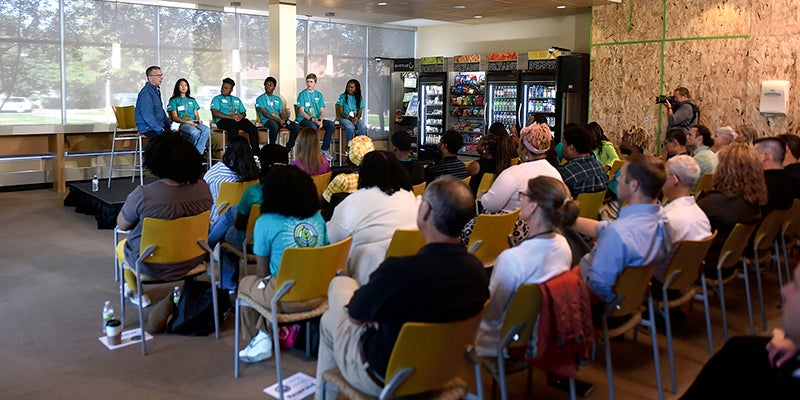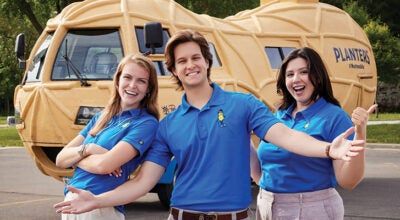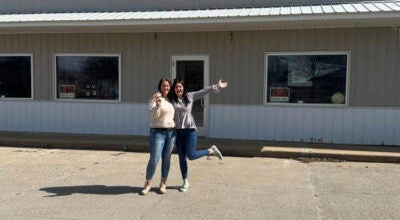The art of aluminum; Collision Specialists learn to fix aluminum-bodied vehicles
Published 10:26 am Friday, April 17, 2015

Josh Canterbury, a technician with Collision Specialists Inc., tries out a new process of taking dents out of aluminum Tuesday. Photos by Eric Johnson/photodesk@austindailyherald.com
Collision Specialists Inc. of Austin has taken on a new challenge: aluminum.
Earlier this year, the business became the first auto-body shop in Mower County to be certified by Assured Performance — a nonprofit consumer advocacy organization — to work on vehicles like the 2015 Ford trucks that are made of aluminum instead of steel.
“About a year ago, they contacted me — Ford did — and asked if we would be on their national program,” said Randy Miller, president of Collision Specialists.
Along with Ford, the shop is also now recognized by Chrysler, GM and Enterprise.
Miller said Ford is estimated to put about 10,000 new, aluminum-bodied 2015 F150 trucks on Minnesota roads by the end of the year. According to Miller, Collision Specialists is the only certified shop in the area working on those and other aluminum vehicles, with the closest shops in Minnesota either in Rochester or Mankato.
Although the technicians haven’t seen any of the trucks in their shop yet, Miller anticipates seeing them within the year.
“I know we’ll have some bang-ups, from deer or other aspects; we just haven’t had it yet,” Miller said.

Randy Peterson, sales and service associate with Straight and Square, takes Collision Specialist technicians through the process of taking dents out of aluminum bodies.
The shop saw about 800 vehicles last year — about four each day.
Since Ford didn’t have enough body shops certified to handle fixing the aluminum vehicles, company officials contacted Miller to see if his business would be interested in partnering with them for the service.
“It was quite an honor, actually,” Miller said.
The shop had until Jan. 1, 2015, to get the tools and equipment needed to work on the aluminum bodies. Miller said they had many of the tools, and the things they didn’t have cost about $60,000 — but it was an investment he was willing to make.
Working with the aluminum is different than steel and required special training for the technicians.
“You have to heat the metal and then cool it and hold it, you don’t just take a hammer and blast it out, it doesn’t work that way,” Miller said. “It’ll have a memory and it will go back.”
The technicians have taken online training through Ford and learned from trainers sent to the shop to show things work. Working with aluminum also requires a different type of welding, and the trucks have about 2,200 rivets and glue, according to Miller.
“The technology in repairing them is totally different, so that’s why [Ford] wanted the best shops … to be able to fix them,” Miller said. “And they want to make sure they get fixed right.”
Miller said the technicians have caught on quickly.
“The repairability is not going to be a problem,” he said. “It’s just how to do it.”
Three of the shop’s nine technicians are now certified technicians to work with aluminum, though only one was required.
Along with the training, the business also had to put up new safety measures, such as curtains to separate the work spaces between the aluminum and steel cars, to become certified. Miller said if aluminum and steel touch, they corrode fairly fast.

Randy Peterson works on a dent in an aluminum hood as he shows Collision Specialist technicians a new process to remove dents from aluminum.
Eric Johnson/photodesk@austindailyherald.com
They also set up large vacuums for filtering the air, since aluminum is bad for the lungs. They also have an entire set of tools that will only work with the aluminum vehicles to avoid any chance of steel and aluminum corrosion.
Miller said one main reason for Ford’s decision to use aluminum instead of steel was to make the truck lighter, which saves gas mileage, and there’s less chance for the body to rust.
“They saved 700 pounds by making them aluminum,” Miller said.
He noted the employees have seen cars with aluminum hoods in the past few years, but said he is excited to get one of the new vehicles in to work on.
“We can’t wait to get our hands on one, we’re body men,” Miller said about the vehicles. “We can’t wait to see one come in, it’ll be a different challenge for us. We’ve always been the shop that takes it on, we’ll put it that way. We enjoy it; the technicians enjoy something different.”





